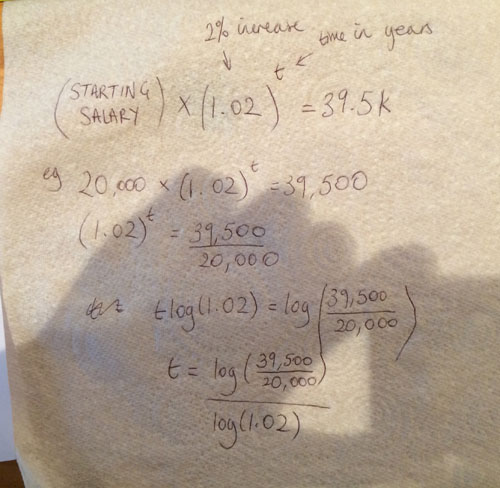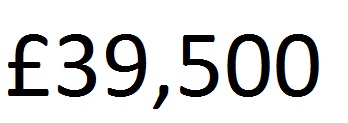We weren't too sure how to tackle this article at first, so we needed a little help. So firstly we'd like to thank Nick Ho, a final year Economics student at the University of Sussex, for helping us with the maths involved in this article via a formula etched on kitchen roll.

At GRB we're always working to find graduates that perfect graduate placement at some of the best companies. We'd like to think that our hard work leads to career satisfaction, but considering the many theories about a connection between money and happiness, we've taken a look at how long it'll take current graduates to become 'happy'.
Back in 2008, Jobsite.co.uk revealed that the average British worker would be happy to receive just £1000 more per month than their current salary. Back then, the average salary was around £25,000, so £38,000 was deemed as the 'salary of happiness'. Now this is all speculation, and not a particularly concrete statistic, but if we were to update the figures slightly (the current average salary is £26,500 + £1000 extra a month, ie. £13,000), 2015's salary of happiness would be... *drumroll*

Now we know what you're thinking - that's a lot of money for a fresh-faced graduate and not all job sectors would offer that sort of dosh. Plus, if we were to factor in inflation rises, £38k five years ago would now roughly be £46k (but let's just ignore that for now).
Now let's compare this to what the US believes to be the salary-happiness tipping point. According to a popular academic study from 2010, $75,000 is the top most salary that shows a rising correlation between salary and day-to-day happiness. Once you reach a salary above the tipping point, you obviously have more money, but you won't become happier because of it. With exchange rates and inflation factored in, that figure for British workers would be roughly £55,000.
So what does this mean?

Well we now have an optimum happiness range of £39.5k - £55k. If you're lucky enough to earn an amount between these salaries, then expect daily rainbows and involuntary skipping. Yet for current graduates averaging a starting salary of around £26,500 - £29,000, it's going to take some time before your wallet screams "Look at me, I'm so happy!"
After calculating that the average graduate starting salary rise over the last ten years was 3.15%, we've worked out how many years it will take you (on average) to reach £39,500. And it's even in a handy little table below. Again, this is all very speculative as it doesn't account for any other financial factors (such as bonuses, promotions etc.) or the fact that the sector you enter may not offer salaries of £39.5k or higher. But hopefully this will show you that hard work is still needed once you manage to jam your foot in the door. Otherwise that brilliant Maths degree will only make you 'happy' after 17.2 years of sitting stagnantly.
So how long until I'm 'happy'?
Search for your degree below (organised by amount of years until salary happiness) to give you a rough idea. The time may seem high and disheartening, but this is exactly why you need to reach for the stars (yes, that's an S Club 7 lyric) and knock off some of those years!
| Degree Type | Average Starting Salary | Years Until 'Happiness' |
| Dentistry | £30,143 | 8.7 |
| Medicine | £29,146 | 9.8 |
| Chemical Engineering | £27,151 | 12.1 |
| Veterinary | £25,807 | 13.7 |
| Economics | £25,673 | 13.9 |
| Engineering | £24,937 | 14.8 |
| Social Work | £24,630 | 15.2 |
| Mechanical Engineering | £24,337 | 15.6 |
| Civil Engineering | £23,720 | 16.4 |
| Maths | £23,160 | 17.2 |
| Physics | £22,964 | 17.5 |
| Nursing | £21,910 | 19.0 |
| Religious Studies | £21,794 | 19.2 |
| Computer Science | £21,712 | 19.3 |
| Accounting and Finance | £21,551 | 19.5 |
| Geology | £21,182 | 20.1 |
| Business Studies | £21,007 | 20.4 |
| Classics and Ancient History | £20,869 | 20.6 |
| Politics | £20,831 | 20.6 |
| Sociology | £20,774 | 20.7 |
| German | £20,675 | 20.9 |
| Anthropology | £20,223 | 21.6 |
| Philosophy | £20,097 | 21.8 |
| Pharmacology | £20,059 | 21.8 |
| French | £20,034 | 21.9 |
| Chemistry | £19,948 | 22.0 |
| History | £19,909 | 22.1 |
| Geography | £19,844 | 22.2 |
| Biology | £19,204 | 23.3 |
| Law | £18,911 | 23.7 |
| Italian | £18,745 | 24.0 |
| English | £18,338 | 24.7 |
| Psychology | £18,173 | 25.0 |
| Linguistics | £18,074 | 25.2 |
| Architecture | £17,873 | 25.6 |
| Archaelogy | £17,675 | 25.9 |
| Hospitality | £17,664 | 25.9 |
| Drama | £17,446 | 26.3 |
| Media Studies | £17,358 | 26.5 |
| Art and Design | £17,300 | 26.6 |
| Music Studies | £16,925 | 27.3 |
 At GRB we're always working to find graduates that perfect graduate placement at some of the best companies. We'd like to think that our hard work leads to career satisfaction, but considering the many theories about a connection between money and happiness, we've taken a look at how long it'll take current graduates to become 'happy'.
Back in 2008, Jobsite.co.uk revealed that the average British worker would be happy to receive just £1000 more per month than their current salary. Back then, the average salary was around £25,000, so £38,000 was deemed as the 'salary of happiness'. Now this is all speculation, and not a particularly concrete statistic, but if we were to update the figures slightly (the current average salary is £26,500 + £1000 extra a month, ie. £13,000), 2015's salary of happiness would be... *drumroll*
At GRB we're always working to find graduates that perfect graduate placement at some of the best companies. We'd like to think that our hard work leads to career satisfaction, but considering the many theories about a connection between money and happiness, we've taken a look at how long it'll take current graduates to become 'happy'.
Back in 2008, Jobsite.co.uk revealed that the average British worker would be happy to receive just £1000 more per month than their current salary. Back then, the average salary was around £25,000, so £38,000 was deemed as the 'salary of happiness'. Now this is all speculation, and not a particularly concrete statistic, but if we were to update the figures slightly (the current average salary is £26,500 + £1000 extra a month, ie. £13,000), 2015's salary of happiness would be... *drumroll*
 Now we know what you're thinking - that's a lot of money for a fresh-faced graduate and not all job sectors would offer that sort of dosh. Plus, if we were to factor in inflation rises, £38k five years ago would now roughly be £46k (but let's just ignore that for now).
Now let's compare this to what the US believes to be the salary-happiness tipping point. According to a popular academic study from 2010, $75,000 is the top most salary that shows a rising correlation between salary and day-to-day happiness. Once you reach a salary above the tipping point, you obviously have more money, but you won't become happier because of it. With exchange rates and inflation factored in, that figure for British workers would be roughly £55,000.
Now we know what you're thinking - that's a lot of money for a fresh-faced graduate and not all job sectors would offer that sort of dosh. Plus, if we were to factor in inflation rises, £38k five years ago would now roughly be £46k (but let's just ignore that for now).
Now let's compare this to what the US believes to be the salary-happiness tipping point. According to a popular academic study from 2010, $75,000 is the top most salary that shows a rising correlation between salary and day-to-day happiness. Once you reach a salary above the tipping point, you obviously have more money, but you won't become happier because of it. With exchange rates and inflation factored in, that figure for British workers would be roughly £55,000.
 Well we now have an optimum happiness range of £39.5k - £55k. If you're lucky enough to earn an amount between these salaries, then expect daily rainbows and involuntary skipping. Yet for current graduates averaging a starting salary of around £26,500 - £29,000, it's going to take some time before your wallet screams "Look at me, I'm so happy!"
After calculating that the average graduate starting salary rise over the last ten years was 3.15%, we've worked out how many years it will take you (on average) to reach £39,500. And it's even in a handy little table below. Again, this is all very speculative as it doesn't account for any other financial factors (such as bonuses, promotions etc.) or the fact that the sector you enter may not offer salaries of £39.5k or higher. But hopefully this will show you that hard work is still needed once you manage to jam your foot in the door. Otherwise that brilliant Maths degree will only make you 'happy' after 17.2 years of sitting stagnantly.
Well we now have an optimum happiness range of £39.5k - £55k. If you're lucky enough to earn an amount between these salaries, then expect daily rainbows and involuntary skipping. Yet for current graduates averaging a starting salary of around £26,500 - £29,000, it's going to take some time before your wallet screams "Look at me, I'm so happy!"
After calculating that the average graduate starting salary rise over the last ten years was 3.15%, we've worked out how many years it will take you (on average) to reach £39,500. And it's even in a handy little table below. Again, this is all very speculative as it doesn't account for any other financial factors (such as bonuses, promotions etc.) or the fact that the sector you enter may not offer salaries of £39.5k or higher. But hopefully this will show you that hard work is still needed once you manage to jam your foot in the door. Otherwise that brilliant Maths degree will only make you 'happy' after 17.2 years of sitting stagnantly.




